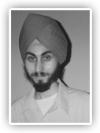2009 - Alumni Update
Zachary Castiglione
I had four different majors at the University of Miami: computer science, mathematics, biology, and finally philosophy. I didn’t know what I wanted to do when I got to the University of Miami. When I left I had learned that your major doesn't have to be critical to what you do after graduation. I am proud to be the only student with a B.A. in Philosophy at the University of California, San Francisco School of Dentistry.
[ READ MORE ]
2008 - Alumni Update
Jane-Mary Trau (Sutnick) (Ph.D. '86)
The University of Miami has been a dominant thread in my personal tapestry, for most of my life. Indeed, in many ways it has been “family.” For instance, growing up in Miami Beach, trips to the Lowe Art Museum were among the most popular family outings. There was, and is, always something magical about the campus which I felt the minute I stepped foot there.
[ READ MORE ]
2007 - Alumni Update
Raymond Belliotti (Ph.D. '77)
Raymond Belliotti is Distinguished Teaching Professor and Chair of the Department of
Philosophy at SUNY Fredonia. He is the author of 7 books and many articles. He received his PhD from the UM Department of Philosophy in 1977. As the reminiscence below indicates, he is a very witty fellow.
[ READ MORE ]
2006 - Alumni Update
Aphrodite Alexandrakis (Ph.D. '86)
 Having a BA in Art History and Archaeology from Rutgers University - Douglas College – rather than a degree in Philosophy – was an obstacle to beginning graduate studies in Philosophy at the University of Miami. As a result, I completed all the relevant undergraduate Philosophy courses at UM as a prerequisite, because of my strong desire to combine my knowledge of ancient Greek art and archaeology with Plato and Aristotle’s notions of beauty. I was very lucky to have as my first Professor on Plato the gentle but strong Dr. Edith Schipper. The late Dr. Schipper’s deep knowledge of Greek philosophy, her positive approach to students, and her encouragement and affirmation of my love for learning philosophy established for me a strong and determined objective to continue my studies. Edith Schipper’s questions to my questions opened up my mind and made me think, research, and read at all times.
Having a BA in Art History and Archaeology from Rutgers University - Douglas College – rather than a degree in Philosophy – was an obstacle to beginning graduate studies in Philosophy at the University of Miami. As a result, I completed all the relevant undergraduate Philosophy courses at UM as a prerequisite, because of my strong desire to combine my knowledge of ancient Greek art and archaeology with Plato and Aristotle’s notions of beauty. I was very lucky to have as my first Professor on Plato the gentle but strong Dr. Edith Schipper. The late Dr. Schipper’s deep knowledge of Greek philosophy, her positive approach to students, and her encouragement and affirmation of my love for learning philosophy established for me a strong and determined objective to continue my studies. Edith Schipper’s questions to my questions opened up my mind and made me think, research, and read at all times.
[ READ MORE ]
2005 - Alumni Update
Stacie Friend (BA '95)
 It has been fourteen years since I took Professor John Knoblock’s Honors Introduction to Philosophy, my first philosophy course at the University of Miami. Although I have taken many and sundry other philosophy courses since then, both for the BA and then for the PhD at Stanford University; and although I have now taught Introduction to Philosophy several times myself; nothing compares to the impression made by that first experience. For it was an unusual experience, as is evident in the reading list: Descartes’ Meditations, Wittgenstein’s On Certainty, and Nietzsche’s Twilight of the Idols and The Anti-Christ. My (admittedly unscientific) survey of fellow philosophy teachers leads me to think that this particular syllabus has never been replicated. Dr. Knoblock introduced the topics by saying that we would be engaging with three authors, each of whom had revolutionized philosophy in a different way, and each of whom continues to challenge philosophers. I certainly found them challenging, in every sense: the texts were difficult, the ideas within surprising or even shocking. Nothing could have been more exciting.
It has been fourteen years since I took Professor John Knoblock’s Honors Introduction to Philosophy, my first philosophy course at the University of Miami. Although I have taken many and sundry other philosophy courses since then, both for the BA and then for the PhD at Stanford University; and although I have now taught Introduction to Philosophy several times myself; nothing compares to the impression made by that first experience. For it was an unusual experience, as is evident in the reading list: Descartes’ Meditations, Wittgenstein’s On Certainty, and Nietzsche’s Twilight of the Idols and The Anti-Christ. My (admittedly unscientific) survey of fellow philosophy teachers leads me to think that this particular syllabus has never been replicated. Dr. Knoblock introduced the topics by saying that we would be engaging with three authors, each of whom had revolutionized philosophy in a different way, and each of whom continues to challenge philosophers. I certainly found them challenging, in every sense: the texts were difficult, the ideas within surprising or even shocking. Nothing could have been more exciting.
[ READ MORE ]
2004 - Alumni Update
Rajdeep Singh Jolly (BA ’03)
 When chatty strangers and inquisitive elders discover that I majored in philosophy at the University of Miami, some give an approving nod and proceed to wax parapsychological or sing the praises of yoga. Others give a disapproving frown and confidently dismiss philosophy as useless. To borrow from law, approving mystics commit misdemeanors by representing their pursuits as philosophy. Philosophy is a rational method of addressing issues that do not admit of empirical resolution. Its practitioners may treat mystical propositions as objects ofphilosophical study, but only if such treatment is devoted to systematic and fair examination of all arguments for and against such propositions. Philosophers may also advance propositions about mystical propositions, but such advancement counts as philosophy only if it is supported by minimally good reasons. To be sure, I only quarrel with approving mystics who fail to abide by the philosophical method. While such mystics arouse mild irritation for representing their pursuits as philosophy, disapproving skeptics arouse outright alarm. To borrow from law, disapproving skeptics commit felonies by doubting the utility of philosophy. Being felonious, disapproving skepticism demands more attention.
When chatty strangers and inquisitive elders discover that I majored in philosophy at the University of Miami, some give an approving nod and proceed to wax parapsychological or sing the praises of yoga. Others give a disapproving frown and confidently dismiss philosophy as useless. To borrow from law, approving mystics commit misdemeanors by representing their pursuits as philosophy. Philosophy is a rational method of addressing issues that do not admit of empirical resolution. Its practitioners may treat mystical propositions as objects ofphilosophical study, but only if such treatment is devoted to systematic and fair examination of all arguments for and against such propositions. Philosophers may also advance propositions about mystical propositions, but such advancement counts as philosophy only if it is supported by minimally good reasons. To be sure, I only quarrel with approving mystics who fail to abide by the philosophical method. While such mystics arouse mild irritation for representing their pursuits as philosophy, disapproving skeptics arouse outright alarm. To borrow from law, disapproving skeptics commit felonies by doubting the utility of philosophy. Being felonious, disapproving skepticism demands more attention.
[ READ MORE ]
2003 - Alumni Update
Alicia Juarero (Ph.D. '78)
 I always assumed I’d be a political science major (as a child of Cuban political exiles, politics was all anyone discussed at the dinner table!). But when I took Dr. Werner’s philosophy of religion course at UM, philosophy grabbed me and didn’t let go. Declaring a philosophy major was also helped by UM’s regulation that allowed students to substitute symbolic logic for a math requirement, which I was keen to do (even though I’ve regretted not taking more math ever since)!
I always assumed I’d be a political science major (as a child of Cuban political exiles, politics was all anyone discussed at the dinner table!). But when I took Dr. Werner’s philosophy of religion course at UM, philosophy grabbed me and didn’t let go. Declaring a philosophy major was also helped by UM’s regulation that allowed students to substitute symbolic logic for a math requirement, which I was keen to do (even though I’ve regretted not taking more math ever since)!
[ READ MORE ]



 Having a BA in Art History and Archaeology from Rutgers University - Douglas College – rather than a degree in Philosophy – was an obstacle to beginning graduate studies in Philosophy at the University of Miami. As a result, I completed all the relevant undergraduate Philosophy courses at UM as a prerequisite, because of my strong desire to combine my knowledge of ancient Greek art and archaeology with Plato and Aristotle’s notions of beauty. I was very lucky to have as my first Professor on Plato the gentle but strong Dr. Edith Schipper. The late Dr. Schipper’s deep knowledge of Greek philosophy, her positive approach to students, and her encouragement and affirmation of my love for learning philosophy established for me a strong and determined objective to continue my studies. Edith Schipper’s questions to my questions opened up my mind and made me think, research, and read at all times.
Having a BA in Art History and Archaeology from Rutgers University - Douglas College – rather than a degree in Philosophy – was an obstacle to beginning graduate studies in Philosophy at the University of Miami. As a result, I completed all the relevant undergraduate Philosophy courses at UM as a prerequisite, because of my strong desire to combine my knowledge of ancient Greek art and archaeology with Plato and Aristotle’s notions of beauty. I was very lucky to have as my first Professor on Plato the gentle but strong Dr. Edith Schipper. The late Dr. Schipper’s deep knowledge of Greek philosophy, her positive approach to students, and her encouragement and affirmation of my love for learning philosophy established for me a strong and determined objective to continue my studies. Edith Schipper’s questions to my questions opened up my mind and made me think, research, and read at all times.  It has been fourteen years since I took Professor John Knoblock’s Honors Introduction to Philosophy, my first philosophy course at the University of Miami. Although I have taken many and sundry other philosophy courses since then, both for the BA and then for the PhD at Stanford University; and although I have now taught Introduction to Philosophy several times myself; nothing compares to the impression made by that first experience. For it was an unusual experience, as is evident in the reading list: Descartes’ Meditations, Wittgenstein’s On Certainty, and Nietzsche’s Twilight of the Idols and The Anti-Christ. My (admittedly unscientific) survey of fellow philosophy teachers leads me to think that this particular syllabus has never been replicated. Dr. Knoblock introduced the topics by saying that we would be engaging with three authors, each of whom had revolutionized philosophy in a different way, and each of whom continues to challenge philosophers. I certainly found them challenging, in every sense: the texts were difficult, the ideas within surprising or even shocking. Nothing could have been more exciting.
It has been fourteen years since I took Professor John Knoblock’s Honors Introduction to Philosophy, my first philosophy course at the University of Miami. Although I have taken many and sundry other philosophy courses since then, both for the BA and then for the PhD at Stanford University; and although I have now taught Introduction to Philosophy several times myself; nothing compares to the impression made by that first experience. For it was an unusual experience, as is evident in the reading list: Descartes’ Meditations, Wittgenstein’s On Certainty, and Nietzsche’s Twilight of the Idols and The Anti-Christ. My (admittedly unscientific) survey of fellow philosophy teachers leads me to think that this particular syllabus has never been replicated. Dr. Knoblock introduced the topics by saying that we would be engaging with three authors, each of whom had revolutionized philosophy in a different way, and each of whom continues to challenge philosophers. I certainly found them challenging, in every sense: the texts were difficult, the ideas within surprising or even shocking. Nothing could have been more exciting. When chatty strangers and inquisitive elders discover that I majored in philosophy at the University of Miami, some give an approving nod and proceed to wax parapsychological or sing the praises of yoga. Others give a disapproving frown and confidently dismiss philosophy as useless. To borrow from law, approving mystics commit misdemeanors by representing their pursuits as philosophy. Philosophy is a rational method of addressing issues that do not admit of empirical resolution. Its practitioners may treat mystical propositions as objects ofphilosophical study, but only if such treatment is devoted to systematic and fair examination of all arguments for and against such propositions. Philosophers may also advance propositions about mystical propositions, but such advancement counts as philosophy only if it is supported by minimally good reasons. To be sure, I only quarrel with approving mystics who fail to abide by the philosophical method. While such mystics arouse mild irritation for representing their pursuits as philosophy, disapproving skeptics arouse outright alarm. To borrow from law, disapproving skeptics commit felonies by doubting the utility of philosophy. Being felonious, disapproving skepticism demands more attention.
When chatty strangers and inquisitive elders discover that I majored in philosophy at the University of Miami, some give an approving nod and proceed to wax parapsychological or sing the praises of yoga. Others give a disapproving frown and confidently dismiss philosophy as useless. To borrow from law, approving mystics commit misdemeanors by representing their pursuits as philosophy. Philosophy is a rational method of addressing issues that do not admit of empirical resolution. Its practitioners may treat mystical propositions as objects ofphilosophical study, but only if such treatment is devoted to systematic and fair examination of all arguments for and against such propositions. Philosophers may also advance propositions about mystical propositions, but such advancement counts as philosophy only if it is supported by minimally good reasons. To be sure, I only quarrel with approving mystics who fail to abide by the philosophical method. While such mystics arouse mild irritation for representing their pursuits as philosophy, disapproving skeptics arouse outright alarm. To borrow from law, disapproving skeptics commit felonies by doubting the utility of philosophy. Being felonious, disapproving skepticism demands more attention. 